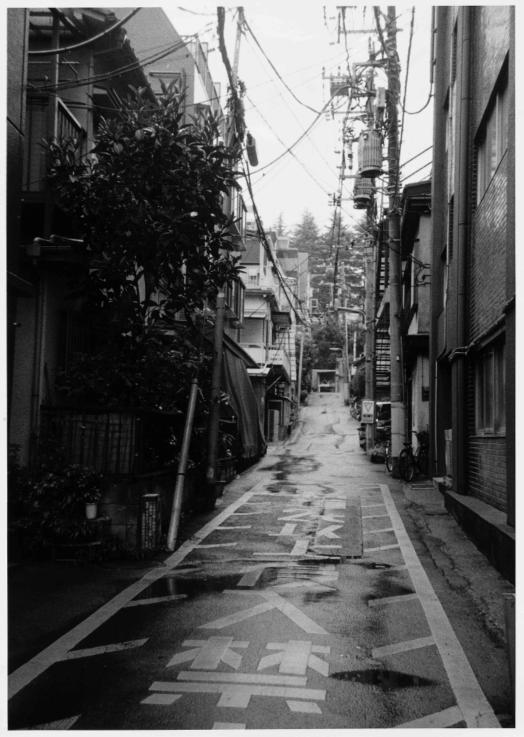「啄木の風景」 岡本正史

「ついにドン底に落ちた」。いまからちょうど100年前、東京の本郷弓町に部屋を借りた24歳の石川啄木は、詩論『弓町より 食うべき詩』でみずからの文学的態度を「ドン底」の貧窮生活のなかから振り返った。新体詩の天才と称され、20歳で結婚、職を求めて北海道へ流れ、上京して2年目の秋だった。啄木の野心は小説家になることであった。しかし、「じっさい書いてみた。そうしてついに書けなかった」。そして自分の原点であるかつての詩作について、はき捨てるように拒絶、否定する。
啄木は過去、実感を詩にするまで煩雑な手続きを要したと述懐する。目の前の空地を広野にし、木を大木にし、日を朝日か夕日にし、自分自身を「詩人にし、旅人にし、若き愁いある人」にしなければ満足することができなかったと。時代は文語詩から口語自由詩へのゆるやかな移行期であった。啄木は断言する。
「我々が「淋しい」と感ずるときに、「ああ淋しい」と感ずるのであろうか、はたまた「あな淋し」と感ずるであろうか。(中略)「ああ淋しい」を「あな淋し」と言わねば満足されぬ心には、無用の手続きがあり、回避があり、ごまかしがある。それらは一種の卑怯でなければならぬ」
街中で、銭湯で、酒場で、坂道で、わたしはときどきこの言葉を思い出す。啄木はおそらく朝湯につかりつつ、またビールを飲みながら、遊郭への途次も、なんとか現在の実感を生活を、もっと言えば、むしゃくしゃした気持ちを中途半端で曖昧な感情を、言葉にできないかと激しく模索していたに違いない。
まもなく啄木は実作として口語自由詩『心の姿の研究』を発表する。その五篇の作品はしかし、全く評価されなかった。歌集『一握の砂』に結集されるまでの過渡的、実験的な試作として論じられることが多いこの詩篇だが、わたしは好きだ。啄木は地べたに足をつけ、目の前を見ようとしている。ぎこちないが輝いている。下手だが強さがある。
一見さりげないが、ここにはむき出しになった啄木の切実な現在が刻印されている。
起きるな、起きるな、日の暮れるまで。
そなたの一生に涼しい静かな夕暮れの来るまで。
何処かで艶めいた女の笑い声。
(『心の姿の研究』から『起きるな』の一節)
−了−
Takuboku's Scenery
"I have finally hit the rock-bottom."Back a hundred years from now, Takuboku Ishikawa, who was 24 years old at the time and just rented a room in Hongoyumicho in Tokyo, looked back his own attitude towards literature from his living in rock-bottom-poverty in his poetics "Poems to be munched from Yumicho. "He was praised as a genius of new-style poetry and got married at the age of 20, moved to Hokkaido to look for a job and he moved toTokyo after that. This was in the fall during his second year in the city.Takuboku's dream was to becomea novel writer. However, "I actually did write. And at the end, I could not write." He detests and rejects poetry in disgust, which was his origin.Awfully complicated procedure was required to create a poem out of his actual feelings in the past. He made an empty space before his eyes into a big open field, a tree was made a huge tree, sun was made into morning sun or evening sunlight, made himself" a poet, a traveler, a young man with the blues" in order to satisfy himself. Takuboku speaks reminiscently. The time was shifting from literary style to casual free style. Takuboku asserts."When we feel "sad", do we feel "oh, I'm sad" or do we feel "oh, how I am sad"? (snip) The fact that you have to say "oh, how I am sad" instead of saying "oh, I'm sad" reveals the multiple and useless processes,avoidance and deception. They must function as a type of dirty tricks."Those words pop up in my mind every now and again, when I'm in a city, at a public bath, bar and in the middle of slopes. Takuboku must have been struggling intensely to verbalize what he is actually feeling right now or this direction less emptiness inside his heart, this unfulfilled and ambigious emotions as he soaked himself in a morning bath, as he took another sip from his beer, as he strolled towards red-light-district. Soon after, he came out with casual free poetry "Heart-Shape-Research." Those 5 pieces of his work were not well received at all.These poems tend to be described as"experimental" or work during his "passing phase" before he finally came out with his famous poetry book "a handful of sand", but I personally am quite fond of this one. Takuboku has his feet tightly on the groundand trying hard to see what is before his eyes. It is clumsy, but proudly shiny. Poorly crafted, but full of strength. It seems ever so subtle but he has carved his compelling and naked "presence" in here.
Do not wake up, do not wake up, until theday is done.
Until the cool and quiet evening glow arrives upon your life.
Woman's alluring laughter somewhere.
(Passage from "Do not wake up" in"Heart-Shape-Research")
「Takuboku's Scenery」 Shohshi Okamoto

「ついにドン底に落ちた」。いまからちょうど100年前、東京の本郷弓町に部屋を借りた24歳の石川啄木は、詩論『弓町より 食うべき詩』でみずからの文学的態度を「ドン底」の貧窮生活のなかから振り返った。新体詩の天才と称され、20歳で結婚、職を求めて北海道へ流れ、上京して2年目の秋だった。啄木の野心は小説家になることであった。しかし、「じっさい書いてみた。そうしてついに書けなかった」。そして自分の原点であるかつての詩作について、はき捨てるように拒絶、否定する。
啄木は過去、実感を詩にするまで煩雑な手続きを要したと述懐する。目の前の空地を広野にし、木を大木にし、日を朝日か夕日にし、自分自身を「詩人にし、旅人にし、若き愁いある人」にしなければ満足することができなかったと。時代は文語詩から口語自由詩へのゆるやかな移行期であった。啄木は断言する。
「我々が「淋しい」と感ずるときに、「ああ淋しい」と感ずるのであろうか、はたまた「あな淋し」と感ずるであろうか。(中略)「ああ淋しい」を「あな淋し」と言わねば満足されぬ心には、無用の手続きがあり、回避があり、ごまかしがある。それらは一種の卑怯でなければならぬ」
街中で、銭湯で、酒場で、坂道で、わたしはときどきこの言葉を思い出す。啄木はおそらく朝湯につかりつつ、またビールを飲みながら、遊郭への途次も、なんとか現在の実感を生活を、もっと言えば、むしゃくしゃした気持ちを中途半端で曖昧な感情を、言葉にできないかと激しく模索していたに違いない。
まもなく啄木は実作として口語自由詩『心の姿の研究』を発表する。その五篇の作品はしかし、全く評価されなかった。歌集『一握の砂』に結集されるまでの過渡的、実験的な試作として論じられることが多いこの詩篇だが、わたしは好きだ。啄木は地べたに足をつけ、目の前を見ようとしている。ぎこちないが輝いている。下手だが強さがある。
一見さりげないが、ここにはむき出しになった啄木の切実な現在が刻印されている。
起きるな、起きるな、日の暮れるまで。
そなたの一生に涼しい静かな夕暮れの来るまで。
何処かで艶めいた女の笑い声。
(『心の姿の研究』から『起きるな』の一節)
−了−
Takuboku's Scenery
"I have finally hit the rock-bottom."Back a hundred years from now, Takuboku Ishikawa, who was 24 years old at the time and just rented a room in Hongoyumicho in Tokyo, looked back his own attitude towards literature from his living in rock-bottom-poverty in his poetics "Poems to be munched from Yumicho. "He was praised as a genius of new-style poetry and got married at the age of 20, moved to Hokkaido to look for a job and he moved toTokyo after that. This was in the fall during his second year in the city.Takuboku's dream was to becomea novel writer. However, "I actually did write. And at the end, I could not write." He detests and rejects poetry in disgust, which was his origin.Awfully complicated procedure was required to create a poem out of his actual feelings in the past. He made an empty space before his eyes into a big open field, a tree was made a huge tree, sun was made into morning sun or evening sunlight, made himself" a poet, a traveler, a young man with the blues" in order to satisfy himself. Takuboku speaks reminiscently. The time was shifting from literary style to casual free style. Takuboku asserts."When we feel "sad", do we feel "oh, I'm sad" or do we feel "oh, how I am sad"? (snip) The fact that you have to say "oh, how I am sad" instead of saying "oh, I'm sad" reveals the multiple and useless processes,avoidance and deception. They must function as a type of dirty tricks."Those words pop up in my mind every now and again, when I'm in a city, at a public bath, bar and in the middle of slopes. Takuboku must have been struggling intensely to verbalize what he is actually feeling right now or this direction less emptiness inside his heart, this unfulfilled and ambigious emotions as he soaked himself in a morning bath, as he took another sip from his beer, as he strolled towards red-light-district. Soon after, he came out with casual free poetry "Heart-Shape-Research." Those 5 pieces of his work were not well received at all.These poems tend to be described as"experimental" or work during his "passing phase" before he finally came out with his famous poetry book "a handful of sand", but I personally am quite fond of this one. Takuboku has his feet tightly on the groundand trying hard to see what is before his eyes. It is clumsy, but proudly shiny. Poorly crafted, but full of strength. It seems ever so subtle but he has carved his compelling and naked "presence" in here.
Do not wake up, do not wake up, until theday is done.
Until the cool and quiet evening glow arrives upon your life.
Woman's alluring laughter somewhere.
(Passage from "Do not wake up" in"Heart-Shape-Research")